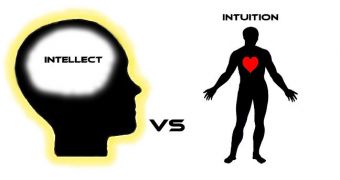According to a new scientific study that focused on the benefits of using intuition in the decision-making process, it would appear that listening to their guts makes people capable of making useful decisions at times. However, in other instances, listening to intuition can lead to costly mistakes.
Many people oftentimes turn to their gut feelings when they need to make a difficult decision, but the conclusion of the new study is that this may not always be such a good idea.
The entire purpose of turning to this innate human guidance mechanism is to take the correct course of action in a given situation, but gut feelings at times set people on a path that does not solve the problem, but rather makes it worse.
One of the main conclusions in the research is that what happens in the human body physically is one of the main influences in determining what intuition will tell someone about a given topic.
According to a paper published in the latest issue of a journal of the Association for Psychological Science, called Psychological Science, it would appear that our intuition's trustworthiness level variates with physical modifications that our body suffers on a daily basis.
“We often talk about intuition coming from the body – following our gut instincts and trusting our hearts,” explains the first author of the journal paper, expert Barnaby D. Dunn, PhD.
The researcher holds an appointment at the Medical Research Council Cognition and Brain Sciences Unit, in Cambridge, the UK, PsychCentral reports. “What happens in our bodies really does appear to influence what goes in our minds,” he adds.
“We should be careful about following these gut instincts, however, as sometimes they help and sometimes they hinder our decision making,” the researcher goes on to say.
In order to tease out these conclusions in the new study, the expert and his team set up an experiment in which participants needed to win a game of cards they never played before.
The game was designed in such a manner that test subjects could not tease out any potential reoccurring strategy for winning. As such, they had to base their decisions on their hunches.
What the study revealed amazed researchers. It would appear that people who were more aware of their heartbeats were capable of making the best hunch-based decisions.
Researchers figured this out by outfitting all patients with heart sensors capable of detecting heartbeats. Those who could literally listen to their hearts were a lot more likely to make the correct decisions in any situations.
Those in the other group did not make the right decisions under the circumstances, even if they reported listening to their intuition.

 14 DAY TRIAL //
14 DAY TRIAL //